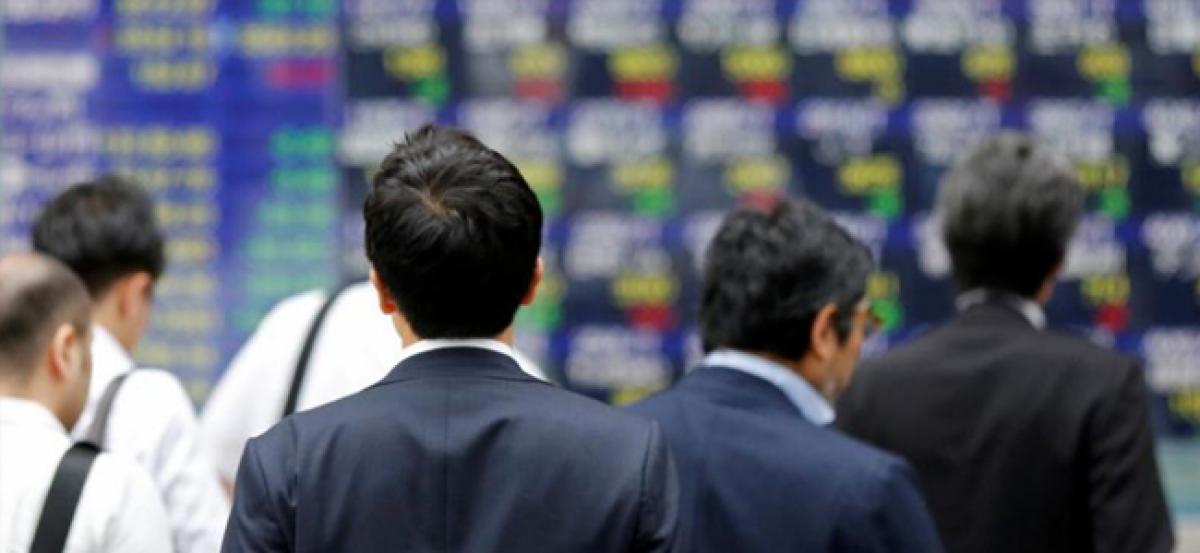Live
- Govt plans to establish offshore Johns Hopkins University Campus in India
- Goa Aces clinch Indian Racing League title
- Study finds how hormone therapy can reshape the skeleton
- High-street fashion players looking at India for manufacturing: Report
- Shreyas Iyer to lead Mumbai as Prithvi Shaw returns for Syed Mushtaq Ali Trophy
- 'Failed to resolve crisis': NPP withdraws support from BJP govt in Manipur
- Chennai: Actress Kasturi Remanded in Custody Until 29th of This Month
- Aaqib Javed likely to become Pakistan's new white-ball head coach
- BJP panel to draft poll charge sheet against AAP govt in Delhi
- Allu Arjun Thanks Fans in Patna, Teases 'Pushpa 2' Release
Just In

Risk appetite in Europe chilled on Friday after a new exchange of barbs between North Korea and the U.S. sparked a knee-jerk sell-off in politically sensitive metals, while focus turned to a speech by the British Prime Minister on Brexit.
LONDON: Risk appetite in Europe chilled on Friday after a new exchange of barbs between North Korea and the U.S. sparked a knee-jerk sell-off in politically sensitive metals, while focus turned to a speech by the British Prime Minister on Brexit.
Europe’s main stock index fell in early trading, following a slide in Asian stocks and a rush to safe-haven currencies overnight after North Korea said it might test a hydrogen bomb in the Pacific Ocean.
Metals prices were battered by heightened geopolitical risk in Asia, making mining stocks the biggest weights in early European trading.
Risk aversion drove investors into the Swiss franc and Japanese yen, with the Swiss currency up 0.2 percent to 0.9688 francs per dollar, while the yen firmed 0.4 percent.
Stealing North Korea’s thunder for European investors was a hotly anticipated speech by Prime Minister Theresa May in Florence, in which she was expected to update her vision of Brexit negotiations.
The pound hovered at a two-month high against the euro, having firmed against both euro and dollar this week as traders anticipated she would lean towards a softer tone on negotiations for Britain’s exit from the bloc.
“Sterling’s rally in the past couple of weeks is partly in reaction to the Bank of England but also reflects an assumption that it’s more likely we do get a transitional deal,” said Mike Bell, global market strategist at JP Morgan Asset Management.
“If that’s what May is laying out today that would be supportive, but I think you have seen a lot of that move priced in already,” he added.
Options were pricing a large GBP/USD reaction to the speech.
Euro zone businesses ended the third quarter with much stronger growth than predicted, PMI surveys showed, adding to evidence of the region’s newfound dynamism which has spurred strong inflows into European equities this year.
“This encouraging economic backdrop is strengthening the EU governments’ optimism about the future, helping to reinforce their firm stance vis a vis the UK in the Brexit negotiations,” said Societe Generale cross-asset strategists.
The euro gained 0.4 percent to $1.1989, on track to end the week higher.
The dollar index against a basket of six major currencies was down 0.5 percent at 91.854.
Crude oil prices rose 0.3 percent as ministers from the Organization of the Petroleum Exporting Countries, Russia and other producers geared up to meet later on Friday to discuss a possible extension of supply cuts.
Europe’s energy stocks outperformed, underpinned by stronger crude prices, with Brent crude also hitting a new five-month high, up 0.3 percent at $56.59 a barrel.
Chinese stocks slipped as traders reacted to rating agency S&P Global cutting the country’s credit score, raising the possibility Hong Kong’s rating could also be in jeopardy. Hong Kong’s Hang Seng index dropped 0.8 percent.
South Korea’s KOSPI fell 0.7 percent on the latest bout of geopolitical tensions.
Safe-haven gold ticked up 0.4 percent at $1,296.31 an ounce, after marking its lowest since Aug. 25 at $1,287.61 in the previous session on a firmer dollar.
The 10-year Treasury yield declined about 2 basis points to 2.257 percent as risk aversion favoured government bonds. It had risen for nine consecutive sessions prior, brushing a six-week high of 2.289 percent.
German bond yields hardly budged ahead of elections on Sunday which market participants said would yield no big surprises with Chancellor Merkel likely to win a fourth term.
MSCI’s world equity index, which tracks shares in 46 countries, remained on track to eke out a weekly gain, holding near its latest record high hit on Wednesday as investors’ enthusiasm for stocks showed few signs of waning.

© 2024 Hyderabad Media House Limited/The Hans India. All rights reserved. Powered by hocalwire.com







